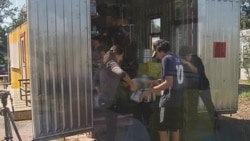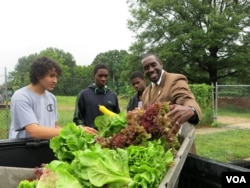Farms are sprouting up in vacant city lots and abandoned properties across the United States. By tilling the soil in places where people have little access to fresh food, these urban farms have the power to change what people eat and the power to transform troubled neighborhoods.
This healthier lifestyle is taking root in a community near Washington, D.C., where a group of young people are spending their summer learning how to cook healthy food.
The six teens apply their skills in a kitchen set up in a shipping container at Eco City Farms. The farm is an oasis of freshly grown produce in an otherwise bleak landscape of strip malls, car repair shops and fast food marts.
For example, Philip Sidibe makes a plantain dish that is popular in his native Cameroon. He and brother Adam have been in the United States for less than a year.
Margaret Morgan-Hubbard founded Eco City Farms to make this food desert bloom. The social activist says the scarcity of fresh produce is a major health problem for these kids and their families who live nearby in Bladensburg, a historic town on the Anacostia River.
“What’s critical is that 70 percent of the people in these towns are either overweight, obese, have diabetes or other kinds of diet-related ailments because they don’t have access to healthy food," Morgan-Hubbard said. "So we are very concerned that this is a social justice issue, that everybody had a right not just to food, but to food that nourishes and supports their bodies and that’s what we work on.”
The teens not only cook their food, they also grow it in a large garden next to Autumn Woods Apartments. The low-income housing complex for 1,000 residents is served by one small store stocked largely with snack food.
With the support of Bladensburg Mayor Walter James, Morgan-Hubbard turned an abandoned piece of land into a thriving garden.
“Our young people are phenomenal," James said. "They always do a phenomenal job, whenever they can get their hands on something and they have that tangible thing that they can touch and say, 'I did this. I was part of this.' I believe that helps with the overall sustainability and growth of our community.”
James is working to rezone the property and turn the entire 1.5-hectare lot into a commercial farm to serve the community.
Tameka Barbour-Gaskins likes the idea. She lives in Autumn Woods, where her son attends camp and spends time in the garden. The whole family is reaping the benefits.
“I like junk food. I like quick food," Barbour-Gaskins said. "It’s not easy just to go from eating a certain way all your life to switching over to being healthier… With the garden here, with my son learning, he can help me switch around my style of eating. I want a healthy family.”
Meanwhile, back at Eco City Farms, it’s time for lunch.
There are plenty of spicy lentils and rice, a Libyan stew and fried plantains from Cameroon accompanied by fruit and lettuce just picked from the garden.
Morgan-Hubbard says the urban garden is a magnet for change and these young people are its newest advocates.
“Our program is about planting seeds," she said. "It’s about planting seeds not just in the ground, but in other human beings so that the movement can grow and it’s really exciting because… these young people will be working with us throughout the year to help plan the actual farm and to organize the community and ultimately own it.”
This means not only farming food, but also making that food available to people who live in the community.
This healthier lifestyle is taking root in a community near Washington, D.C., where a group of young people are spending their summer learning how to cook healthy food.
The six teens apply their skills in a kitchen set up in a shipping container at Eco City Farms. The farm is an oasis of freshly grown produce in an otherwise bleak landscape of strip malls, car repair shops and fast food marts.
For example, Philip Sidibe makes a plantain dish that is popular in his native Cameroon. He and brother Adam have been in the United States for less than a year.
Margaret Morgan-Hubbard founded Eco City Farms to make this food desert bloom. The social activist says the scarcity of fresh produce is a major health problem for these kids and their families who live nearby in Bladensburg, a historic town on the Anacostia River.
“What’s critical is that 70 percent of the people in these towns are either overweight, obese, have diabetes or other kinds of diet-related ailments because they don’t have access to healthy food," Morgan-Hubbard said. "So we are very concerned that this is a social justice issue, that everybody had a right not just to food, but to food that nourishes and supports their bodies and that’s what we work on.”
The teens not only cook their food, they also grow it in a large garden next to Autumn Woods Apartments. The low-income housing complex for 1,000 residents is served by one small store stocked largely with snack food.
With the support of Bladensburg Mayor Walter James, Morgan-Hubbard turned an abandoned piece of land into a thriving garden.
“Our young people are phenomenal," James said. "They always do a phenomenal job, whenever they can get their hands on something and they have that tangible thing that they can touch and say, 'I did this. I was part of this.' I believe that helps with the overall sustainability and growth of our community.”
James is working to rezone the property and turn the entire 1.5-hectare lot into a commercial farm to serve the community.
Tameka Barbour-Gaskins likes the idea. She lives in Autumn Woods, where her son attends camp and spends time in the garden. The whole family is reaping the benefits.
“I like junk food. I like quick food," Barbour-Gaskins said. "It’s not easy just to go from eating a certain way all your life to switching over to being healthier… With the garden here, with my son learning, he can help me switch around my style of eating. I want a healthy family.”
Meanwhile, back at Eco City Farms, it’s time for lunch.
There are plenty of spicy lentils and rice, a Libyan stew and fried plantains from Cameroon accompanied by fruit and lettuce just picked from the garden.
Morgan-Hubbard says the urban garden is a magnet for change and these young people are its newest advocates.
“Our program is about planting seeds," she said. "It’s about planting seeds not just in the ground, but in other human beings so that the movement can grow and it’s really exciting because… these young people will be working with us throughout the year to help plan the actual farm and to organize the community and ultimately own it.”
This means not only farming food, but also making that food available to people who live in the community.







